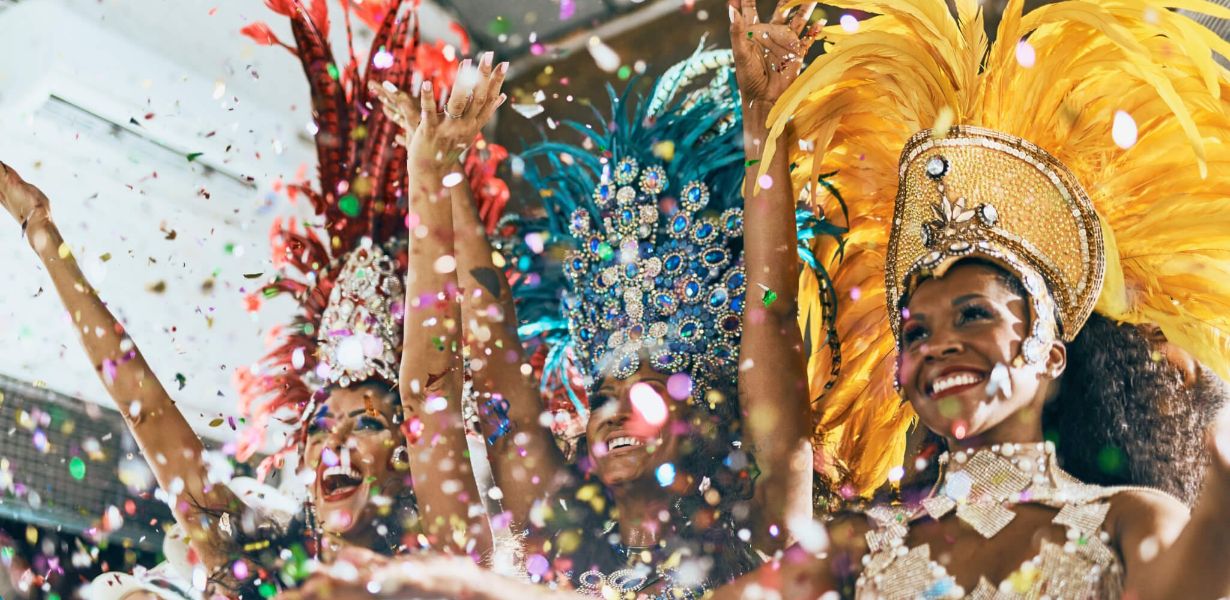
Dive into the heart of Brazil’s exuberance and let the rhythm of samba and the vivacity of colors sweep you off your feet at the renowned Brazilian Carnival. This grand fiesta is more than just a festival; it’s a cultural extravaganza that transcends time, captivating millions with its electrifying energy, captivating parades, and spirited atmosphere. From the famous Rio Carnival to the lesser-known local celebrations, we’re about to embark on a journey into the soul of Brazilian Carnival, providing insights into everything from securing Rio Carnival 2024 tickets to the delights of traveling to Brazil for this awe-inspiring event.
The Origin and Evolution of Brazilian Carnival
At the crossroads of history, religion, and culture, Brazilian Carnival has a multifaceted origin. With roots in Portuguese colonial influences, African traditions, and indigenous rituals, the festival began as a blend of diverse cultural elements. Over centuries, it evolved into the spectacular event it is today, embracing both tradition and modernity.
Rio Carnival 2024 Tickets: Your Gateway to the Extravaganza
Securing Rio Carnival 2024 tickets is your passport to a once-in-a-lifetime experience. The anticipation builds as performers rehearse tirelessly, preparing to transform the streets into a pulsating dance floor. From grand samba schools showcasing their elaborate floats and costumes to the infectious beats that echo through the city, every element of Rio Carnival is a testament to Brazil’s boundless passion.
The Mesmerizing Parade: A Visual Symphony of Culture
The highlight of Brazilian Carnival is undoubtedly the parade, where samba schools from different neighborhoods compete in an artistic showcase of skill and creativity. These samba schools invest countless hours perfecting their routines, and each parade is a vibrant story told through dance, music, and costume. The pulsating energy of the crowd and the dedication of the performers create an atmosphere that resonates with unity and joy.
Samba: The Heartbeat of Brazilian Carnival
Samba isn’t just a dance; it’s the rhythm that echoes in the hearts of Brazilians year-round. The energetic and intricate dance moves are a testament to the dedication and skill of the performers. Whether you’re an experienced dancer or a curious traveler, samba workshops offer a chance to learn this iconic dance form, allowing you to immerse yourself in the carnival spirit.
Beyond the Parades: Embracing Local Carnival Traditions
While the Rio Carnival steals the spotlight, many other cities and regions across Brazil celebrate carnival in unique ways. From the traditional “Frevo” dance in Recife to the colorful “Bumba-meu-boi” performances in Northeastern Brazil, each locale adds its own flair to the festivities. Exploring these diverse celebrations offers a deeper understanding of the country’s rich cultural tapestry.
Carnival and Brazilian Identity
Brazilian Carnival is more than a celebration; it’s a reflection of Brazil’s identity. It showcases the country’s history, resilience, and joy in the face of adversity. The festival provides a platform for social commentary, allowing samba schools to address current issues through their performances. This fusion of entertainment and cultural critique adds depth to the revelry.
Traveling to Brazil for Carnival: Practical Tips
If you’re planning to travel to Brazil for carnival, a little preparation goes a long way. Ensure your travel documents are in order, and book accommodations well in advance, as this event draws visitors from around the world. Immerse yourself in the local culture by indulging in Brazilian cuisine, exploring markets, and interacting with locals to truly capture the essence of the festival.
Carnival’s Economic Impact: Boosting Tourism and Beyond
Brazilian Carnival isn’t just a cultural spectacle; it’s also a significant driver of the country’s economy. The influx of tourists, both domestic and international, boosts various sectors, from hospitality to retail. The event’s economic impact underscores its importance beyond its artistic and cultural significance.
Sustainability and Carnival: Balancing Tradition and Environment
In recent years, there’s been a growing focus on sustainability within the realm of Brazilian Carnival. As the environmental impact of large-scale events comes into focus, samba schools and organizers are incorporating eco-friendly practices, from using recyclable materials in costumes to promoting responsible waste disposal during parades.
Final Words
In a mesmerizing tapestry of music, dance, and culture, Brazilian Carnival transcends borders and languages. It’s an invitation to experience the essence of Brazil, to dance to the rhythm of life, and to embrace the unbridled joy that the festival brings. So, whether you’re donning a flamboyant costume or swaying to the beats, let the spirit of Brazilian Carnival set your heart aglow.
Commonly Asked Questions
Q1: What is the best way to secure Rio Carnival 2024 tickets?
A1: To secure your spot at the Rio Carnival 2024, book your tickets through official sources or trusted travel agencies well in advance. This ensures you don’t miss out on the electrifying festivities.
Q2: How can I experience the carnival like a local?
A2: Immerse yourself in the culture by attending local neighborhood celebrations, participating in workshops to learn samba, and engaging with locals to gain insights into their carnival traditions.
Q3: Are there family-friendly aspects to Brazilian Carnival?
A3: Absolutely! Many carnival events offer family-friendly parades, workshops, and activities. Check with local organizers to find events suitable for all ages.
Q4: What is the significance of carnival costumes?
A4: Carnival costumes are a visual representation of Brazilian culture, history, and creativity. They tell stories, celebrate traditions, and express individual and collective identities.
Q5: How can I contribute to the sustainability of Brazilian Carnival?
A5: You can contribute by opting for eco-friendly accommodations, supporting events that prioritize sustainability, and being mindful of your waste disposal during the festivities.





